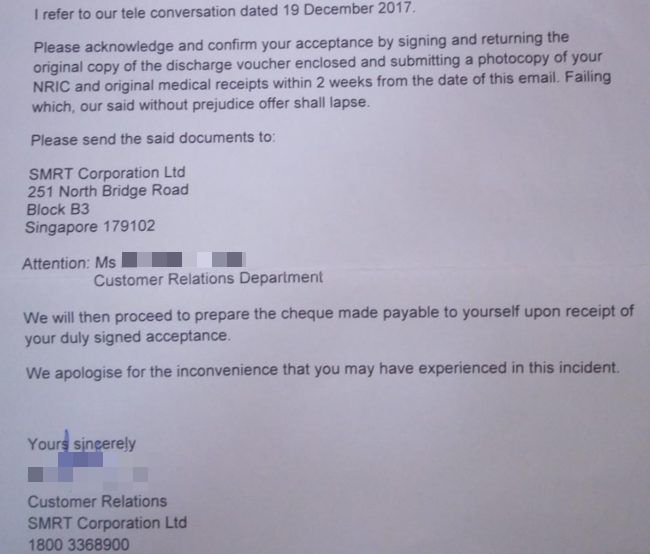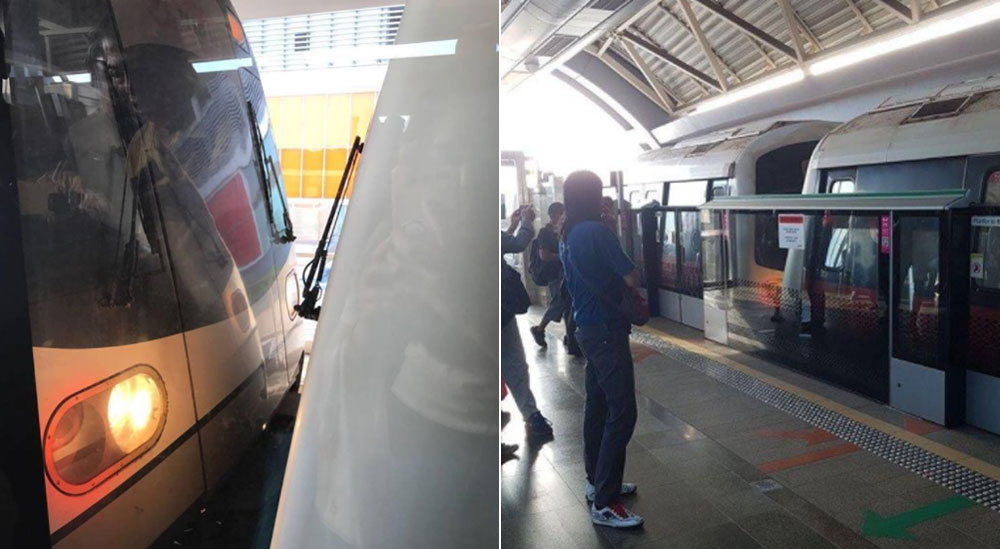One of the biggest train disruptions to hit our North-South Line was caused by the flooding of the tunnel at Bishan MRT station, back in October 2017.
The middle of November 2017 saw another accident that led to significantly more injury: the collision of two trains at Joo Koon MRT station.
It was so bad — especially coming off the October 2017 flooding-induced disruption — that Transport Minister Khaw Boon Wan gave an apology after a joint SMRT-Land Transport Authority press conference on the collision:
Passenger asked to sign "discharge voucher"
Enter an unnamed passenger who said he was on board the first carriage of one of the two trains that collided.
The passenger, who wrote a letter to sociopolitical site The Online Citizen, said he had fallen and landed on his backside, and so thought he had gotten away relatively easy.
"However, later that afternoon, my left arm felt completely devoid of strength, and my left ankle started to hurt. The following day, I went to see a clinic doctor. I then proceeded to emailed [sic] the SMRT staff with my medical bills for claims."
One and a half months later, a representative from SMRT responded to let the passenger know that his claim was approved, but said he would have to sign a "discharge voucher" — images of which he appended to his letter:
 Image of letter via The Online Citizen
Image of letter via The Online Citizen
 Image via The Online Citizen
Image via The Online Citizen
From this, there were three things he took issue with:
- That the payment was final and that no further claims would be accepted,
- That it required him to agree that even though they were settling his medical bills, they were not accepting or admitting to liability for the accident that led to his injuries... them, as well as "its related companies or their respective servants or agents or hirers or insurers", and
- That it required him to agree to keep the terms of the settlement agreement confidential and not shared with anyone without written permission from SMRT.
[related_story]
Passenger said nope
And he goes on to explain how he responded:
"Angrily, I told the staff, there was no way in hell that I would sign such a contract. I told them in no uncertain terms, that even if I was agreeable to the first 2 conditions, there was no way that I would sign away my rights to disclosure.
This whole back-and-forth went on for more than 1 week, with the staff transferring the case to her manager, whom I have had to explain all over, that I will under no circumstances surrender my rights to disclose anything that I want to disclose. The manager explained to me that this was simply their company policy, and every claimant had to go through the same things. I told her promptly, her company policies are none of my concern, and they are the ones who caused the problem in the first place. The compensation should have been UNCONDITIONAL."
Eventually, he did get a resolution to his case — the manager at MRT eventually relented and had the $31.70 amount he claimed deposited in his EZ-Link card.
"But at least a resolution was met without having to conform to SMRT's strict procedures. If they chose to, they could have done this better, without having to demand claimants follow their terms unilaterally."
SMRT: Same discharge voucher used in settling all claims from passengers
In a statement shared with Mothership, Vice President for Corporate Communications at SMRT Margaret Teo said the same discharge voucher is typically used in settling any claims from passengers — not simply in this instance or incident.
However, she added, the operator is working to improve its processes on this front as well as others, factoring in feedback from commuters:
"SMRT welcomes commuters’ input. Our Commuter Engagement team has taken input from the incident and we are making continuous improvements as part of our company Kaizen initiatives to serve our commuters better. The safety and well-being of our commuters are our top priorities."
By the way, on the issue of liability
It's possible the authorities didn't press as heavily on SMRT for the Joo Koon train collision as they did for the October flooding incident and train disruptions — even though there were 38 passengers and SMRT staff injured from the collision — because in this instance, the folks responsible weren't technically SMRT.
To be entirely fair, the fault in this instance was claimed by Thales, the French company that is providing the signalling system for the MRT's North-South and East-West lines, essentially because glitches in the new signalling system they had installed on some stretches of tracks but not others resulted in the failure of two protective buffers that would have prevented a collision.
So, if you think about it, in this instance, it really was not technically SMRT's fault that the collision happened.
However, transport analyst Park Byung Joon was quoted saying the 10-second period that passed between the train's starting to move from its stationary position 36m away and the collision is sufficiently long for a train driver to react and override the automatic action as soon as he noticed the train in his path.
“Ten seconds is quite a long time. If the driver did not do anything because he was waiting for the system to automatically extend and stop the train, then this driver training manual is wrong. The revision for this driver training manual needs to be done immediately.”
But all that said, just in case you were wondering, Kaizen (in Chinese: 改善 pronounced gai shàn) means "continuous improvement" — and so, hopefully, SMRT's working on getting better at this.
Read our other stories on the Nov. 15, 2017 train collision:
Top photos: Facebook post by Mei Anne
Here’s a totally unrelated but equally interesting story:
Uzbekistan is such a beautiful country it sounds like Us Back In An Instant
If you like what you read, follow us on Facebook, Instagram, Twitter and Telegram to get the latest updates.
